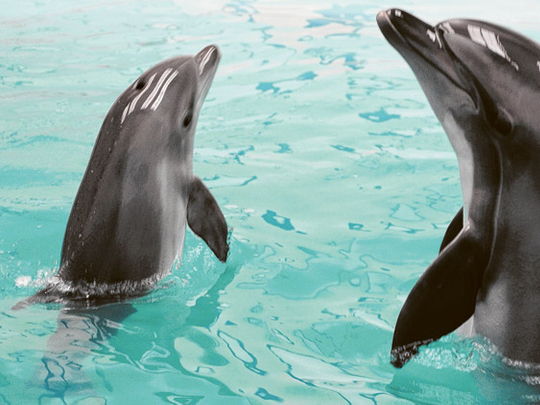
Washington: Flipper probably already had a name long before his human family named him.
Researchers have discovered that bottlenose dolphins address each other using “signature whistles” — indicating that other species came up with names for individuals before humans did, new research shows.
Scientists already knew that dolphins that were closely related would copy each other’s whistles. But it wasn’t clear whether the sounds were signature whistles or other whistle types.
For the new study, published on Monday in the Proceedings of the National Academy of Sciences, marine biologists from the University of St. Andrews in Scotland applied a technique they published in January to identify signature whistles using several criteria, such as their tendency to be repetitive and remain constant over time.
For more than four months, the team followed different groups of wild dolphins off the east coast of Scotland, and identified and recorded each individual’s signature whistle. Using an onboard computer, they created synthetic versions of the whistles that could be played back.
But there was a twist: They removed the vocal characteristics of the dolphins that uttered them. That way, if the whistlers responded, it meant they were reacting to the whistle pattern itself, not simply because they had recognised their own voices.
The team also recorded non-signature whistles from dolphins in the same pod to test whether the animals responded to any familiar voice, regardless of the whistle pattern. Additionally, they created computer-generated versions of whistles from other populations to verify whether the dolphins also responded to unfamiliar voices.
When the researchers played the whistles from an underwater speaker, the dolphins responded only to their own signature whistles. Whenever a dolphin heard its “name”, it responded by whistling it back, often immediately.
Some dolphins approached the boat soon after responding, further supporting signature whistles’ function in helping lost animals reunite with their pod, said marine biologist Stephanie King, the study leader.
Earlier studies have reported that dolphins can copy their signature whistles in captivity, but the PNAS study marks the first to document this phenomenon in the wild, said Laela Sayigh, a marine biologist at Woods Hole Oceanographic Institute in Massachussetts, who was not part of the study.
No two signature whistles are alike, Sayigh said. They can vary dramatically even among closely related individuals — especially females, which she thinks could help calves more easily recognise their mothers among the many females that make up matrilineal dolphin populations.
Sayigh added that scientists still aren’t sure how dolphins create their signature whistles, although recent research has suggested that learning is involved. The diversity of whistles among relatives indicates that they probably aren’t encoded in DNA. Also, about 30 per cent of the male calves Sayigh and her group have observed emitted whistles similar to those of their mothers, suggesting that they model them after whistles they’ve already heard.
But it’s also possible that dolphins create their “names” by piecing together snippets of different whistles, or they may simply produce them spontaneously, Sayigh said. “We don’t really have an exact answer,” she said.
King noted that while her study demonstrates that dolphins use signature whistles to address each other, whether they use them to refer to other individuals — such as two dolphins referring to a third individual located elsewhere — is less clear.
“I think there’s a strong likelihood they can, but we’ve still got a lot more to explore,” she said.
Sayigh said the study may help answer larger questions besides whether dolphins call each other by name.
“There’s a big question looming as to whether dolphins use whistles in the way we use words,” similar to how “we can say ‘chair’ and visualise ‘chair’ without having to see one at the same time,” Sayigh said. While more research needs to be done to conclude whether this occurs in dolphins, the PNAS study is “a step along the way”, she said.
King said her group plans to begin decoding other whistle types, besides signature whistles.
“This is the first taste we really have of naming in the animal kingdom,” she said, adding that other studies have suggested that parrots might engage in a similar behaviour. “I think we can really open the door now and look at this in more animals.”











